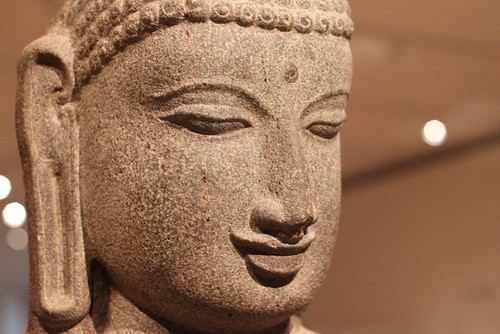
ataraxy /AT-ər-aks-ee/ – ataraxia /at-ər-AK-see-ə/. noun. Deep tranquility; calmness. Stoic indifference. From French ataraxie > from Greek ataraxia (impassiveness) > from a (not) + tarassein (disturb). See also: serenity, imperturbability, equanimity, composure.
“Hope and ataraxia shrivel away, he is shocked into desperate reality.” (James Tiptree, Jr.)
“I was nonplussed, I stared at my teacher, never before had his swollen face seemed so replete with indifference, stone ataraxy.” (Will Self)
“…maybe this is how it goes: the boy dies and she’s like you, numbed of feeling, not concerned about anything. Practically in a state of ataraxia…” (Clarice Lispector)
“I would give the whole universe and all of Shakespeare for a grain of ataraxy.” (E. M. Cioran)
“One begins to go about with the sluggish step of a philosopher or a clochard, as more and more vital gestures become reduced to mere instincts of preservation, to a conscience more alert not to be deceived than to grasp truth. Lay quietism, moderate ataraxia, attent lack of attention.” (Julio Cortazar)
“The Epicurean ideal was ataraxia, imperturbability and mental detachment. This imperturbability couldn’t be accomplished through avoidance—pain would come whether you wanted it or not—but only through the right way of thinking about all unavoidable experience.” (Mark Greif)
“Freedom from worry; freedom from pain. Ataraxia and aponia: the Epicurean ideal.” (John McManus)
“His joy at the event was greater than his progress in ataraxy should have allowed.” (Anatole France)
“Oh, coffee, el café. Our country has survived for centuries thanks to this plant and the Arabic drink. It’s a docile, attenuated drug, with a marvellous effect, for it stimulates one’s consciousness without letting it get out of control or driving it crazy. Ideal brew for somnolence or laziness, for despondency or apathy, for ataraxy or an excess of resignation.” (Hector Abad)
“Was this serenity? Or was it simply the disguise of a passivity that counts happiness as the absence of fear and the absence of desire? If ataraxia signified serenity, perhaps the price was passivity.” (Carlos Fuentes)



